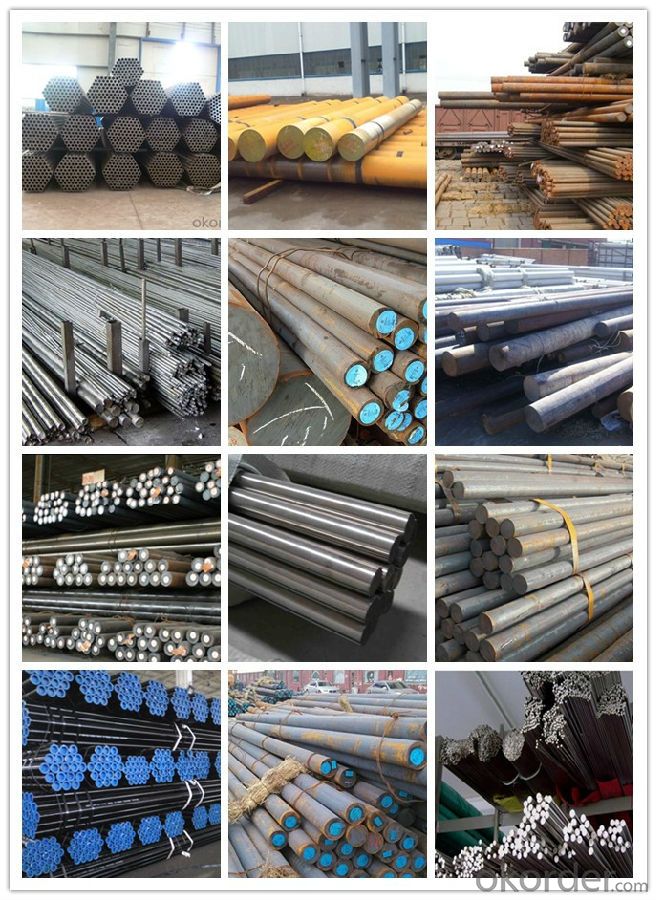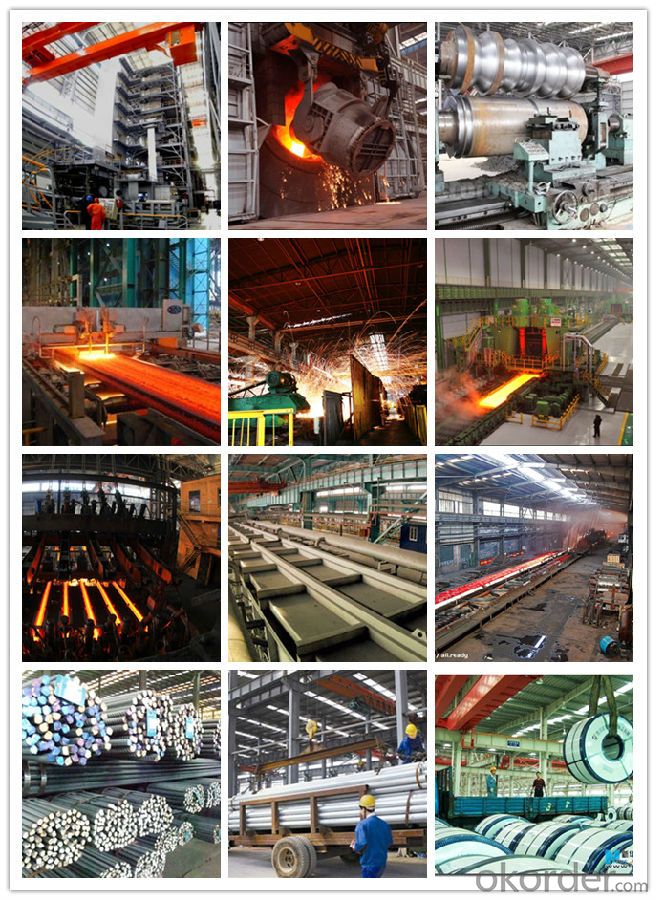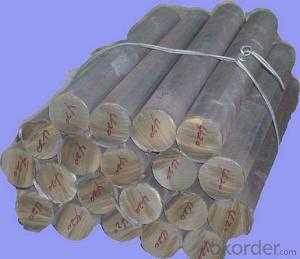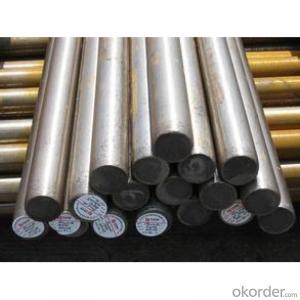Din 1.2510 Steel K460 Material Steel Plate
- Loading Port:
- China main port
- Payment Terms:
- TT OR LC
- Min Order Qty:
- 30 m.t.
- Supply Capability:
- 10000 m.t./month
OKorder Service Pledge
OKorder Financial Service
You Might Also Like
Item specifice
Din 1.2510 Steel K460 Material Steel Plate
Product information:
Specifications
MOQ:10MT
Delivery time:60days
Dimention:Dia 14-500mm
Steel Bar AISI O1, DIN 1.2510, GB 9CrWMn ,JIS SKS3
9CrWMn:Competitive price on a FOB basis
Cold Work Mould Steel
AISI O1,DIN 1.2510, GB 9CrWMn,JIS SKS3
1) Chemicial composition: C=0.85~0.95, Si=0.20~0.40, Mn=1.00~1.30, Cr=0.40~0.60, W=0.40~0.60, V=0.10~0.20.
2) Delivery condition: EAF or ESR, hot rolled or forged, black or machined surface, annealed, hardness: HBS≤228.
3)Usually specification:(customer requested size)
Thickness:20~500mm
Width:500~1200mm
Round Bar Size :50~500mm
Length:1000~6000mm
4) Application: used for making mini surface and shape complex cold punching moulds.
5)Payment terms:30% deposit,balance against LC at sight or TT
| Equivalent grades | GB | DIN | AISI | JIS | |||||
| 9CrWMn | 1.251 | O1 | SKS3 | ||||||
| Chemical Composition | C | Si | Mn | Cr | P | S | V | W | |
| 0.90-1.05 | 0.15-0.35 | 1.00-1.20 | 0.50-0.70 | 0.03MAX | 0.03MAX | 0.05-0.15 | 0.50-0.70 | ||
| Available size | Round Bar | Diameter | Length | ||||||
| 10-380mm | 2000-5800mm | ||||||||
| Flat Bar | Thickness | Width | Length | ||||||
| 12-500mm | 60-900mm | 2000-5800mm | |||||||
| Surface condition | Black surface/ Grinded/ Machined | ||||||||
| Annealed hardness | HB210MAX | ||||||||
| Characteristics | Din 1.2510 K460 hot rolled alloy steel plate | ||||||||
| High wear resistance | |||||||||
| High surface hardness after tempering; | |||||||||
| Good dimensional stability during heat treatment; | |||||||||
| Good machinability | |||||||||
| Applications | Din 1.2510 K460 hot rolled alloy steel plate | ||||||||
| Cutting and punching tools | |||||||||
| shear knives, thread rolling tools | |||||||||
| measuring instruments, platinum using molds | |||||||||
| Heat treatment | Hardening | ||||||||
| Harden from a temperature of 780-820oC followed by oil, warm bath (180-220oC) quenching. Hardness after quenching is 64 HRC. | |||||||||
| Tempering | |||||||||
| Tempering temperature: See the table bellow. | |||||||||
| Tempering Temperature (oC) vs. Hardness (HRC) | |||||||||
| 100°C | 200°C | 300°C | 400°C | 500°C | |||||
| 64 | 61 | 56 | 51 | 44 | |||||
Product show

Workshop show

Our service:
-High manufacturing accuracy
-High strength
-Small inertia resistance
-Strong heat dissipation ability
-Good visual effect
-Reasonable price
Chose happens because of quality, then price, We can give you both.Additionally, we can also offer professional products inquiry, products knowledge train(for agents), smooth goods delivery, exellent customer solution proposals.Our service formula: good quality+good price+good service=customer's trust
SGS test is available, customer inspection before shipping is welcome, third party inspection is no problem.
If you need the sample, please feel free to let me know. Any question, we will contact you ASAP!
- Q:How is tool steel different from other types of special steel?
- Tool steel is different from other types of special steel primarily because it is specifically designed to withstand high levels of stress and heat while maintaining its hardness and durability. It is specifically formulated to have high resistance to wear, abrasion, and deformation, making it ideal for cutting, drilling, and shaping tools. Unlike other special steels, tool steel has a balanced combination of properties like hardness, toughness, and heat resistance, which makes it suitable for use in various industrial applications where high-performance tools are required.
- Q:What are the different methods for improving the toughness of tool steels used in special steel?
- Tool steels used in special steel applications can be toughened through various methods. The goal is to increase their resistance to fracture and ability to absorb energy without becoming brittle. Some techniques for improving the toughness of tool steels include: 1. Alloying: Adding specific alloying elements like chromium, molybdenum, vanadium, and tungsten significantly enhances the toughness. These elements form carbides within the steel matrix, improving toughness. 2. Heat treatment: Proper heat treatment greatly improves toughness. Quenching and tempering are commonly used processes. Quenching rapidly cools the steel, resulting in a hardened structure. Tempering involves reheating and slow cooling to relieve internal stresses and increase toughness. 3. Controlled cooling rates: Optimizing toughness is possible by controlling the cooling rate during heat treatment. Slow cooling allows for a more uniform microstructure, leading to improved toughness. 4. Grain refinement: Refining the grain size enhances toughness. This can be achieved through hot working, controlled rolling, or adding grain refining elements like titanium or zirconium. 5. Surface treatments: Shot peening or nitriding can improve toughness. Shot peening bombards the steel surface with small metal or ceramic particles, creating compressive residual stresses that enhance toughness. Nitriding diffuses nitrogen into the surface, forming a hard and wear-resistant layer. 6. Cryogenic treatment: Subjecting the tool steel to extremely low temperatures for an extended period refines the microstructure and reduces residual stresses, improving toughness. 7. Powder metallurgy: Techniques like hot isostatic pressing or sintering can produce tool steels with improved toughness. Fine powder, high pressure, and temperature result in a more uniform and fine-grained microstructure, increasing toughness. Ultimately, the specific methods selected and combined depend on the tool steel's requirements and intended application. By carefully considering these techniques, manufacturers can enhance the toughness of tool steels for demanding special steel applications.
- Q:What are the properties of high-temperature alloy steel?
- High-temperature alloy steel possesses several important properties, including excellent strength, resistance to corrosion and oxidation, exceptional heat resistance, and the ability to retain its mechanical properties even at elevated temperatures. These alloys are specifically designed to withstand extreme heat and pressure, making them ideal for applications in industries such as aerospace, power generation, and oil and gas.
- Q:Can special steel be used for precision instruments?
- Yes, special steel can be used for precision instruments. Special steel, known for its high strength, durability, and resistance to corrosion, is often used in the manufacturing of precision instruments such as surgical tools, watches, measuring devices, and scientific equipment. Its unique properties allow for precise and accurate performance, making it an ideal material choice for precision instruments.
- Q:How does hot rolling affect the microstructure of special steel?
- Hot rolling, a metalworking process, involves heating steel above its recrystallization temperature and passing it through rollers to reduce thickness. This process significantly affects the microstructure of special steel. When steel is hot rolled, the high temperature prompts the grains to recrystallize, eliminating defects and creating a more uniform and refined grain structure. This leads to smaller, equiaxed grains, which enhance the steel's mechanical properties. Furthermore, hot rolling encourages the formation of microstructural features like dislocation cells and subgrains. These features increase the steel's strength and toughness, making it suitable for applications requiring high performance and durability. Moreover, hot rolling can cause certain alloying elements to precipitate within the steel. These precipitates play a crucial role in enhancing specific properties such as corrosion resistance or high-temperature strength. Overall, hot rolling profoundly impacts the microstructure of special steel. It refines the grain structure, promotes beneficial microstructural features, and facilitates the precipitation of alloying elements. These changes contribute to improved mechanical properties and performance, making hot rolled steel a preferred choice in industries like automotive, aerospace, and construction.
- Q:How is special steel used in the production of turbine blades?
- Special steel is used in the production of turbine blades due to its exceptional strength, heat resistance, and corrosion resistance properties. These blades have to withstand high temperatures, extreme pressures, and rotational forces, making special steel an ideal material choice. Its exceptional qualities ensure the blades can efficiently convert the energy of steam or gas into mechanical energy, enabling turbines to generate power in various applications such as power plants, aircraft engines, and gas turbines.
- Q:What are the different machining techniques used for special steel?
- Some of the different machining techniques used for special steel include turning, milling, drilling, grinding, and broaching. Each technique has its own advantages and is used depending on the specific requirements of the steel and the desired outcome of the machining process.
- Q:What are the specific requirements for special steel used in the marine shafting industry?
- The specific requirements for special steel used in the marine shafting industry are as follows: 1. Corrosion Resistance: Special steel used in marine shafting must have high resistance to corrosion due to the harsh conditions encountered in marine environments. It should be able to withstand constant exposure to saltwater, humidity, and other corrosive elements without deterioration. 2. Strength and Toughness: Marine shafting steel should possess high strength and toughness to withstand the heavy loads and vibrations experienced in marine operations. It should be able to withstand the continuous stress and dynamic loads without failure or deformation. 3. Fatigue Resistance: The steel used in marine shafting should have excellent fatigue resistance to withstand the cyclical loading experienced during operation. It should be able to endure millions of load cycles without developing cracks or fractures. 4. Dimensional Stability: Special steel used in marine shafting must exhibit dimensional stability to ensure precise alignment and fit within the machinery. It should have minimal dimensional changes under varying temperature and humidity conditions to maintain the integrity of the shaft system. 5. Machinability: It is essential for the steel used in marine shafting to be easily machinable to create complex shapes, such as propeller shafts and couplings. This allows for efficient manufacturing and maintenance of the shafting components. 6. Non-Magnetic Properties: Special steel used in marine shafting must possess low magnetic permeability to avoid interference with sensitive navigation and communication equipment. Non-magnetic properties minimize the risk of compass errors and electromagnetic interference. 7. Certification and Compliance: The steel used in marine shafting should meet specific industry standards and certifications, such as those set by classification societies like the American Bureau of Shipping (ABS) or the International Association of Classification Societies (IACS). These certifications ensure the steel's quality, performance, and adherence to safety regulations. Meeting these specific requirements ensures that the special steel used in marine shafting provides reliable performance, durability, and safety in marine applications.
- Q:Can special steel be used in the manufacturing of household appliances?
- Certainly, household appliances can indeed be manufactured using special steel. Also known as alloy steel, special steel possesses a range of desirable attributes such as exceptional strength, durability, and resistance to both corrosion and wear. These characteristics render it suitable for a wide array of applications, including the production of household appliances. When it comes to household appliances like refrigerators, ovens, dishwashers, and washing machines, it is essential to utilize materials that can endure constant utilization, high temperatures, as well as exposure to water and chemicals. Special steel fulfills these requirements and provides a dependable and long-lasting solution. To exemplify, stainless steel represents a common type of special steel employed in household appliances due to its resistance to corrosion and hygienic properties. It finds application in various appliance components such as refrigerator doors, oven interiors, and dishwasher interiors. Stainless steel is easily cleaned, maintains its appearance over time, and does not react with food or other substances, making it an ideal selection for household appliances. Moreover, special steel alloys can be employed to enhance specific properties required in different appliances. For instance, heat-resistant alloys can be utilized in ovens or stovetops, while high-strength steel alloys can be employed in appliances necessitating structural integrity, such as washing machines or dryers. In conclusion, special steel can certainly find use in the manufacturing of household appliances. Its diverse properties, encompassing strength, durability, corrosion resistance, and versatility, make it a superb material choice for ensuring the performance, longevity, and safety of household appliances.
- Q:Can special steel be used in the production of bearings?
- Yes, special steel can be used in the production of bearings. Special steel alloys, such as stainless steel or chrome steel, offer enhanced properties like corrosion resistance, high strength, and durability, making them suitable for bearing applications in various industries.
1. Manufacturer Overview |
|
|---|---|
| Location | |
| Year Established | |
| Annual Output Value | |
| Main Markets | |
| Company Certifications | |
2. Manufacturer Certificates |
|
|---|---|
| a) Certification Name | |
| Range | |
| Reference | |
| Validity Period | |
3. Manufacturer Capability |
|
|---|---|
| a)Trade Capacity | |
| Nearest Port | |
| Export Percentage | |
| No.of Employees in Trade Department | |
| Language Spoken: | |
| b)Factory Information | |
| Factory Size: | |
| No. of Production Lines | |
| Contract Manufacturing | |
| Product Price Range | |
Send your message to us
Din 1.2510 Steel K460 Material Steel Plate
- Loading Port:
- China main port
- Payment Terms:
- TT OR LC
- Min Order Qty:
- 30 m.t.
- Supply Capability:
- 10000 m.t./month
OKorder Service Pledge
OKorder Financial Service
Similar products
New products
Hot products
Related keywords






























